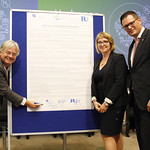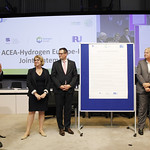IRU joined the European Automobile Manufacturers’ Association (ACEA) and Hydrogen Europe in calling for accelerated deployment of hydrogen refuelling infrastructure across the EU, in order to meet ambitious decarbonisation targets set for road transport.
In a statement issued today, the three organisations urge the European Commission, European Parliament and European Council to provide the right framework to support the roll-out of hydrogen infrastructure across Europe.
This implies revising the Alternative Fuels Infrastructure Directive (AFID) to include hydrogen infrastructure and set mandatory targets for long distance transport and commercial vehicles; creating a hydrogen ecosystem across the continent; deploying funding to aid hydrogen projects and initiatives; and ensuring the hydrogen industry is operating in a supportive regulatory environment.
Road transport operators across Europe have embraced ambitious CO2 and greenhouse gas emissions reduction targets. However, investment in new technology will be required in order to meet them, especially with demand in the freight and passenger sectors set to grow by 60% and over 40% respectively by 2050.
Hydrogen fuel cell technology – using sustainably produced hydrogen – is an attractive proposition compared to battery electric and complementary to CNG and LNG solutions for long-distance trucks and coaches due to its favourable energy content and operational flexibility for transport operators.
The news comes as IRU launched a new initiative to test hydrogen trucks and gather important data for the industry in cooperation with a European consortium of truck manufacturers, fuel cell suppliers and logistics companies. The H2Haul project will gather data during 5 years from a fleet of 16 heavy goods vehicles of up to 44 tonnes, operated by suppliers of supermarket chains in Switzerland, France, Germany and Belgium. Innovative hydrogen refuelling infrastructure will be installed at test locations to reliably and efficiently supply these trucks.










